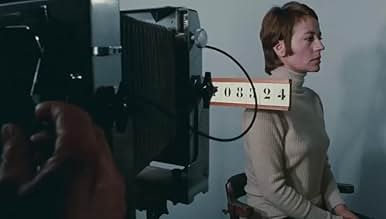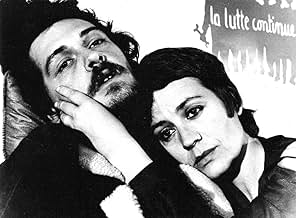Rouen, France, 1968: Danièle is an unconventional French teacher. Every morning she takes her pupil Gérard to school. He flirts with her and she reciprocates his affection. This brings the p... Read allRouen, France, 1968: Danièle is an unconventional French teacher. Every morning she takes her pupil Gérard to school. He flirts with her and she reciprocates his affection. This brings the parents and the school authorities onto the scene.Rouen, France, 1968: Danièle is an unconventional French teacher. Every morning she takes her pupil Gérard to school. He flirts with her and she reciprocates his affection. This brings the parents and the school authorities onto the scene.
- Awards
- 2 nominations total
Marcelle Ranson-Hervé
- Madame Jaias - la voisine
- (as Marcelle Ranson)
Marianik Revillon
- Cécile
- (as Mariannik Revillon)
- Director
- Writers
- All cast & crew
- Production, box office & more at IMDbPro
Storyline
Did you know
- TriviaThe second highest grossing movie in France of its year.
Featured review
More than 50 years have passed since the film 'Mourir d'aimer' was made and released on screen, one of the blockbusters of French cinema in 1971. Watching or rewatching it today is a good opportunity to appreciate how approaches have changed since - both cinematic, but also legally and mentally - about relationships between people separated by significant age differences, but also to what extent many things remained the same, or could be judged more severely in our times of political correctness. André Cayatte, the film's director and co-writer, a lawyer by training, also a writer and a journalist, had a passion for bringing to the screens interesting and complex cases that had passed in one form or another through the French justice system. Although the film begins with a confusing disclaimer that denies resemblance to real characters, 'Mourir d'aimer' is based on a true love story between a high school teacher and her student, who had made a sensation three years before, in the tumultuous year of 1968. The screen version of this story is interesting and the film is worth watching, both as a legal and moral document, but also for its consistent artistic qualities.
This movie has one of the most beautiful movie or book titles I know of: 'Mourir d'aimer' means 'to die of love'. However, the love story, which provides the emotional motivation for this case, is almost completely neglected. I think this was intentional. Writing the screenplay for the film, Cayatte almost completely avoided the romantic aspect in favor of a realistic rendering of the explosive social environment before and during the events of May 1968, including the joint involvement of teachers and students in protest movements against the system. What followed is thus presented as a kind of violent reaction or even retaliation by the system against the protesters. This would be a pretty interesting plot by itself, but the love story, with all its beauty and its controversies is almost completely ignored at first, and presented with short and superficial scenes later. The choice of actors also contributes to this feeling. Annie Girardot plays the role of the politically-involved teacher, who is also a beautiful, divorced woman with two children, finely describing the phases of her personal attitude - from the safe-confidence of the woman who knows her rights, to the revolt against the oppressive system, and at last the despair of defeat. However, the reasons why the heroine overcomes moral and professional taboos and transforms the teacher-student relationship into what should be a stormy and tragic love story remain unclear. The role of her student and boyfriend is played by Bruno Pradal, an actor launched by this film and whose career was tragically cut by a car accident, but who does not have the charm and charisma to emotionally justify, on screen, the relationship between the two.
We are left with that part of the story that fits perfectly with André Cayatte - the judicial mechanism set in motion by the boy's parents' complaint, the criminal complicity of the various components of the system, starting with the hypocrisy of the teaching staff, going through psychiatric examinations and abusive hospitalizations, to the rigidity of the judicial system. The bright counterpoint is provided by the group of high school students, the generation raised in the atmosphere of the 1968 protest movements, which would largely change French society in the coming decades. From a contemporary perspective, however, we cannot but ask ourselves how such a case would be judged socially and in the media today. 'Mourir d'aimer' is a tragic love story set on an interesting historical background, a film in which the background image is clearer than the silhouettes of the foreground lovers.
This movie has one of the most beautiful movie or book titles I know of: 'Mourir d'aimer' means 'to die of love'. However, the love story, which provides the emotional motivation for this case, is almost completely neglected. I think this was intentional. Writing the screenplay for the film, Cayatte almost completely avoided the romantic aspect in favor of a realistic rendering of the explosive social environment before and during the events of May 1968, including the joint involvement of teachers and students in protest movements against the system. What followed is thus presented as a kind of violent reaction or even retaliation by the system against the protesters. This would be a pretty interesting plot by itself, but the love story, with all its beauty and its controversies is almost completely ignored at first, and presented with short and superficial scenes later. The choice of actors also contributes to this feeling. Annie Girardot plays the role of the politically-involved teacher, who is also a beautiful, divorced woman with two children, finely describing the phases of her personal attitude - from the safe-confidence of the woman who knows her rights, to the revolt against the oppressive system, and at last the despair of defeat. However, the reasons why the heroine overcomes moral and professional taboos and transforms the teacher-student relationship into what should be a stormy and tragic love story remain unclear. The role of her student and boyfriend is played by Bruno Pradal, an actor launched by this film and whose career was tragically cut by a car accident, but who does not have the charm and charisma to emotionally justify, on screen, the relationship between the two.
We are left with that part of the story that fits perfectly with André Cayatte - the judicial mechanism set in motion by the boy's parents' complaint, the criminal complicity of the various components of the system, starting with the hypocrisy of the teaching staff, going through psychiatric examinations and abusive hospitalizations, to the rigidity of the judicial system. The bright counterpoint is provided by the group of high school students, the generation raised in the atmosphere of the 1968 protest movements, which would largely change French society in the coming decades. From a contemporary perspective, however, we cannot but ask ourselves how such a case would be judged socially and in the media today. 'Mourir d'aimer' is a tragic love story set on an interesting historical background, a film in which the background image is clearer than the silhouettes of the foreground lovers.
Details
- Release date
- Countries of origin
- Official sites
- Language
- Also known as
- Aus Liebe sterben
- Filming locations
- Rouen, Seine-Maritime, France(location)
- Production companies
- See more company credits at IMDbPro
- Runtime1 hour 41 minutes
- Sound mix
Contribute to this page
Suggest an edit or add missing content


























